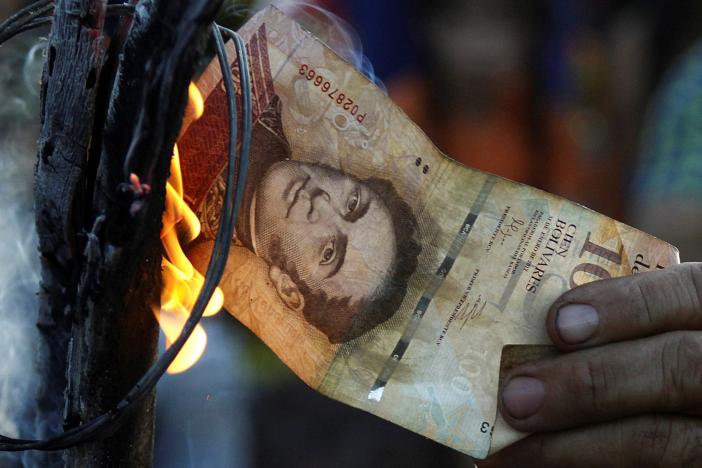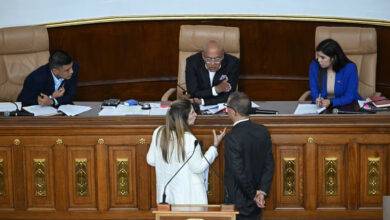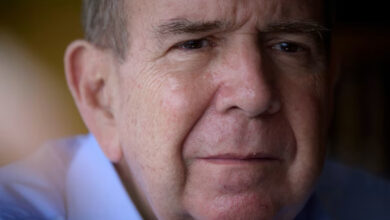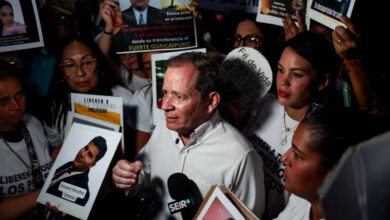Venezuelan President Nicolas Maduro suspended on Saturday the elimination of the country's largest denomination bill, which had sparked cash shortages and nationwide unrest, saying the measure would be postponed until early January.
The surprise pulling of the 100 bolivar note from circulation this week – before new larger bills were available – led to vast lines at banks, looting at scores of shops, anti-government protests and at least one death.
Maduro, speaking from the presidential palace, blamed a "sabotage" campaign by enemies abroad for the delayed arrival of three planes carrying the new 500, 2,000 and 20,000 bolivar notes.
"One plane, contracted and paid for by Venezuela, was told in flight to change direction and go to another country," he said, without specifying who had given the orders. "There is another [plane] which was not given flyover permission."
The 100 bolivar bills, officially out of use since Thursday and worth just 4 US cents at the black market currency rate, can now be used until January 2, Maduro said.
Many Venezuelans had found themselves without the means to pay for food, gasoline or Christmas preparations in a country already reeling from a profound economic crisis.
About 40 percent of Venezuelans do not have bank accounts, and so cannot use electronic transactions as an alternative to cash.
Adding to the chaos, Venezuela has the world's highest rate of inflation, meaning large bags of cash must be humped around to pay for basic items.
Looting and Destruction
Protests and looting broke out in parts of Venezuela on Friday due to a lack of cash after the socialist government suddenly pulled the nation's largest banknote from circulation in the midst of a brutal economic crisis.
An opposition legislator said there were three deaths amid violent scenes in the southern mining town of Callao — but there was no confirmation of that from the government.
Waving the 100-bolivar bills, pockets of demonstrators had blocked roads, demanding that stores accept the cash, and cursing President Nicolas Maduro in a string of towns and cities around Venezuela, witnesses said.
Dozens of shops were looted in various places.
Last weekend, Maduro gave Venezuelans three days to ditch the 100-bolivar bills, arguing that the measure was needed to combat mafias on the Colombia border despite warnings from some economists that it risked sparking chaos.
Opposition leaders said the move was further evidence he is destroying the OPEC nation's economy and must be removed.
Authorities have thwarted a referendum sought by the opposition against the leftist leader. That might enable him to complete a six-year term ending in early 2019, but increases the prospect of social unrest.
With new bills — originally due on Thursday — still nowhere to be seen, many Venezuelans were unable to fill their vehicles' fuel tanks to get to work, buy food or purchase Christmas gifts.
Adding to the chaos, many cash machines were broken or empty. And large lines formed outside the central bank offices in Caracas and Maracaibo where the 100-bolivar bills could still be handed over and deposited for a few days more.
'Mockery'
"This is a mockery," said bus driver Richard Montilva as he and several hundred others blocked a street outside a bank in the town of El Pinal in Tachira state near Colombia.
First Justice lawmaker Angel Medina said large numbers of shops had been ransacked, destroyed and burned in El Callao, with three people killed and many injured.
Reuters could not independently confirm his statements.
Speaking in general terms, Maduro condemned the violence around the country, and said two banks had been attacked by people linked to the opposition coalition.
He said the new bills would come into circulation soon, appealed for the population's "comprehension", and urged Venezuelans to use electronic transactions where possible.
About 40 percent of Venezuelans do not have bank accounts.
Outside the central bank in Caracas, thousands of Venezuelans lined up to swap the 100-bolivar bills before a final Tuesday deadline as National Guard soldiers kept watch.
An orange and avocado vendor offered to buy the notes up for 80 bolivars each.
Maduro's measure has stoked anger among Venezuelans already weary of long lines for food and medicine amid product shortages and triple-digit inflation.
He blames the crisis on an "economic war" waged against his government to weaken the bolivar currency and unseat him.
Critics scoff at that explanation, pointing instead to state controls and excessive money printing.
"I want a change in government. I don't care about changing the bills; they're not worth anything anyway," said Isabel Gonzalez, 62, standing in line at the central bank on Friday.
She said she had just enough cash to get a bus home.





